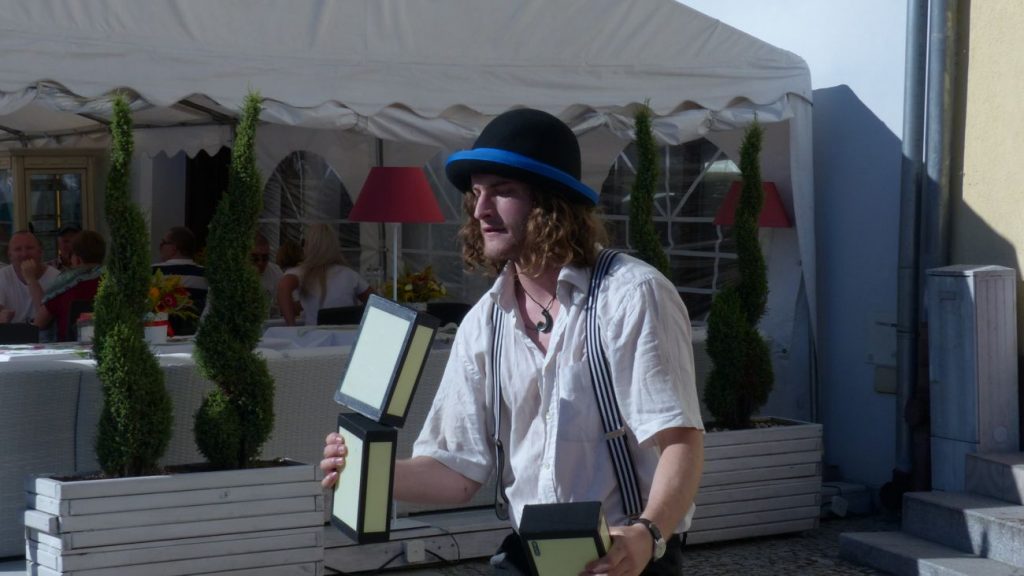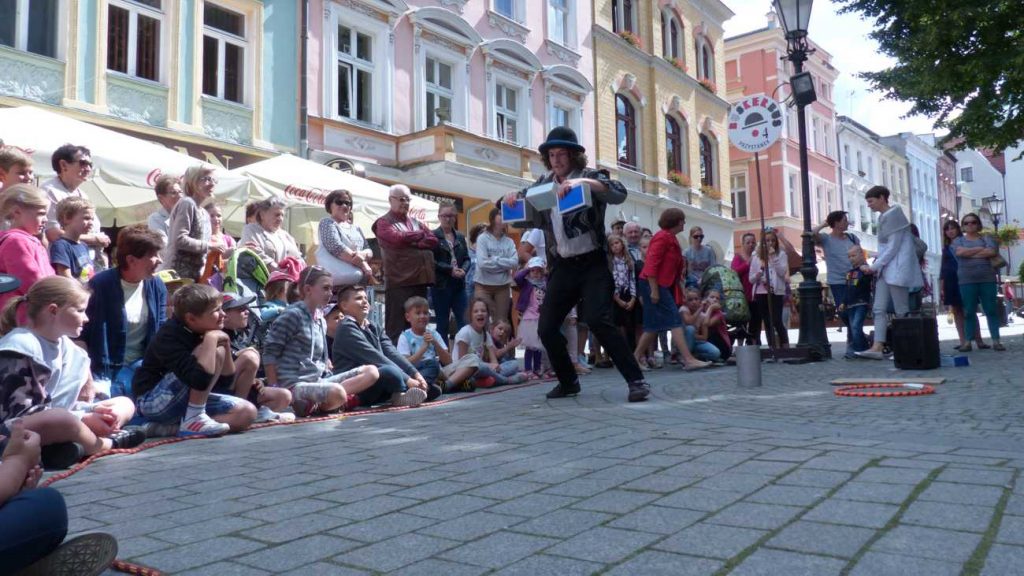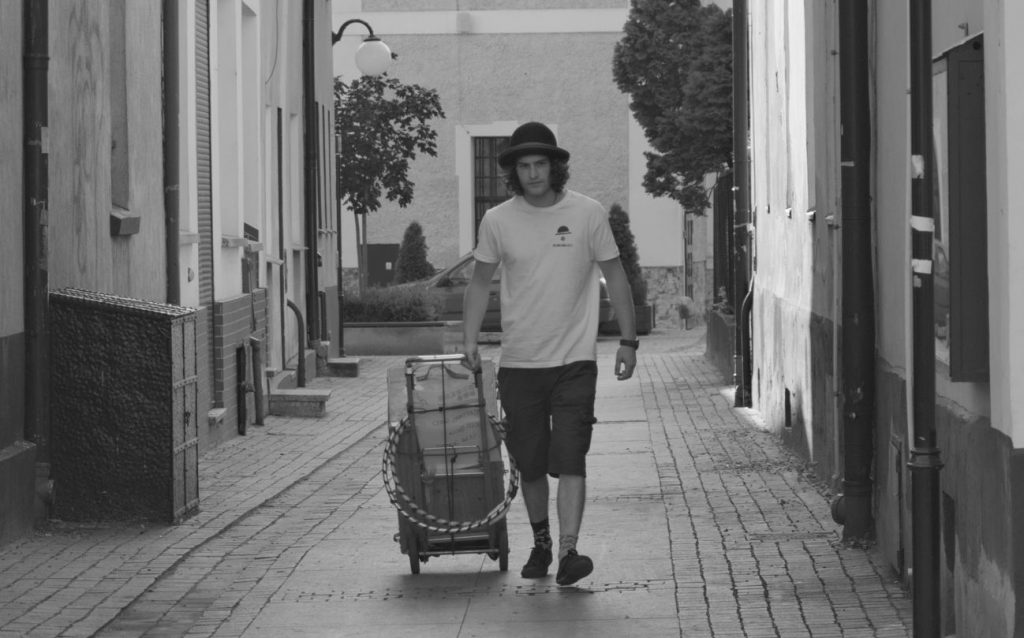Raised in a circus family, Matthias Goed began training and performing from a young age. I asked him about his extraordinary childhood, favourite routine and what it is like to work in the Big Top and on the street.

Hello Matthias, how are you? What have you been up to in the last months? Unlike over here you barely had any restrictions and I’ve seen that you could still work in the street.
I’m doing really well thanks! We ended our ‘lockdown’ at the end of May. I spent June on a 70’ Sailboat with 7 other artists, the Captain and his partner. We put together a circus show and then spent the month sailing around the north of New Zealand bringing it to small and remote communities. That was really an awesome time.
Since then I moved to Wellington where I have been training and doing street shows during the weekends.
My whole life is a circus life
Your family owns Circus Aotearoa and you have been performing in the traditional circus since you were 8 years old. What is it really like growing up in a circus?
From the ages of about 6-10 my family toured with Whirling Bros. Circus. It was the last circus in New Zealand to have animals so I grew up with lions, an elephant, monkeys, donkeys, poodles and ponies in my backyard. I was homeschooled for most of this time except on short occasions where we would take a break from touring and I would attend a regular primary school.
My whole family (Mum, Dad, younger sister and me) lived together in a housetruck. We also had a caravan that was towed behind the truck that was used as a lounge and my classroom.
When I was 8 my parents decided I was old enough to properly learn a circus discipline and as I had naturally good balance I got given a choice between tightwire and rola-bola. I tried both and stuck with rola-bola. From then on, on top of my normal schooling I would have to train between 1 and 3 hours a day.
I did my first real performances in the ring the New Year period when I was 8 or 9. We did 27 shows in 9 days and I got paid out of my parents paycheck.
By this point, my family had settled down a bit and we weren’t touring with Whirling Bros. full time anymore. Instead we would spend some holiday seasons with them as well as travelling to various festivals around New Zealand performing as Artfool Family Circus.
In 2006 the late Tony Ratcliffe, owner of Whirling Bros. Circus, retired with his animals. My parents decided to buy the old Big Top as well as some of the trucks and caravans and started Circus Aotearoa in 2008. The circus has been touring around New Zealand every summer since. I attended a normal highschool and would only tour during school holidays. In 2018 we retired the original Whirlings Big Top and replaced it with a beautiful new Big Top we had custom made in Poland.
Have you ever thought of doing something completely different or have you known since you were a kid that circus is your thing?
For a period in my mid-teens, I hated the circus life. I was always forced to be away from friends during holiday periods and could never join in on their plans. I stepped away from circus briefly to try out a few other jobs but soon realised that nothing was really as exciting. My love for circus really cemented itself when I finished high school and realised that with circus I could easily travel the world doing something fun and positive that brought joy to people.
What has been the most magical moment in your circus life?
That’s a really hard question.
My whole life is a circus life. I don’t think it can boil down to a singular moment but rather it’s a continuous thing. After a really good show, be it in the Big Top, a theatre or on the street, seeing people buzzing after the show with great smiles and excitement, or inspiring kids and showing them what possibilities are out there. That’s always a magical moment for me.
Matthias Goed

I sometimes laugh that I have met more buskers from New Zealand than from Poland so in my mind, this country is all about beautiful landscapes and circus artists performing everywhere! What is the circus scene in your country like?
We used to have a great circus school in New Zealand called CircoArts. Both of my parents studied there. It was part of the polytech university in Christchurch but was unfortunately destroyed in the 2010 earthquake. Since then there hasn’t been any steady circus school that offers a qualification but there are a lot of community and youth circus programs and training spaces all around the country.
We do have a few buskers in New Zealand, it’s a pretty street performer friendly country overall. I think you’ve almost met them all though! We tend to leave for the European summer season as soon as it starts to get a bit chilly here.
Have you seen (or have heard from your family) a change in how people perceive circus over the years?
I have definitely noticed a general downward trend of people attending circuses and live shows in over time. I think it has a lot to do with the internet and people having access to videos online. It’s also possible that high production value shows like Cirque du Soliel can take away from small family owned traditional circuses. Although recently after people being cooped up for such a long time they are very happy for some live entertainment so it is hopefully making a (safe) comeback.
Do you have any experience working with wild animals? Do circuses still need animal acts or should they be banned?
I personally have no experience working with animals. I’ve only been around them as a kid.
It’s definitely not necessary to have animals in a circus. However, personally I see no issue with it as long as they are treated well. I feel that it’s not too different from zoo’s and I have seen both animals in zoos and circuses treated well and badly. Some animals love to perform just like some people love to perform. As long as the animals are happy, enjoying themselves and are treated well I see no issue. I do understand that it is a very difficult thing to police though and an outright ban is easier to enforce than making sure everyone is happy.
Matthias Goed
Having a good stage presence is just as important on the street as it is in the ring
You started busking a couple of years ago. Did you find it difficult to adapt that people didn’t buy the tickets and there was no one waiting to see your show unlike when you performed in Big Tops?
Not at all. I think having spent so much time performing really helped me out. Having a good stage presence is just as important on the street as it is in the ring or on a stage. Gathering a crowd was a bit of a challenge at first but I think having a lot of exposure to street performers when I was young really helped me out.
What do you like the most about performing in the street? And what is the biggest challenge of being a busker?
I love the fact that I can put my box down in the middle of a street anywhere in the world and bring a whole bunch of strangers together to watch a circus show and share a positive experience. It’s also quite comforting to know that wherever I am I can always get enough money for food and a place to sleep.
The biggest challenge while doing a show is always gathering a crowd. Although if you are a full time street performer you are very very reliant on things like the weather in order to make an income and that can be a big challenge too.
What traits do you feel are important for an artist performing in the street versus traditional circus? In the street, most of the buskers perform solo, while in the touring circus you have to spend a lot of time together. I imagine people must be more easy-going and be able to work as a team?
Both are hard work in their own right. As a street performer you have to be resilient and able to deal with a lot of different situations very quickly. You never know what can happen on the street.
When you are touring you are stuck with the same 10 or so people for up to 7 months. You see them almost all day, every day so you quickly have to learn to get along or at least live with each other.
Both can be very exhausting or very rewarding.
You spent some time in Iceland. How did you choose this country and what did you do there?
When I finished school I decided I needed to travel and get out of New Zealand for a bit. An old friend of my dads from CircoArts had just bought a Big Top in Iceland to grow his circus but hadn’t had much experience with putting up big tents. I saw the opportunity and went over to teach their new tent boss the ins and outs of a Big Top. I grew quite close with the Sirkus Islands family and enjoyed my time there so much that I moved there for a year and have travelled back almost every summer to join in their short touring season.
What is a favourite routine to perform?
I love to perform toss. That’s an acrobatic discipline with 3 or more people where two of them are throwing the third around. It’s a lot of fun and definitely my favorite!
What is your skill set? When you work in a circus you are surrounded by experts in various disciplines. Have you tried many of them? Are there skills that you don’t use during your shows but you are actually good at?
I have tried most circus disciplines and have a basic understanding of almost all of them. Of course there are things I can do that aren’t in my shows, but I do like to swap out bits and tricks every now and then to keep things fresh.
What tips do you have for absolute circus beginners? Is there anything they should start with?
I would say start by learning to juggle 3 balls. Find the juggling community in your town and meet up with them. Look for any circus classes or training spaces close by and see if you can take part in anything or at least visit and talk to people. Circus people are all very friendly and encouraging.
Make sure that if you are starting to learn something potentially dangerous, that you have an experienced person there to help. It can be hard and dangerous to try and learn things purely from videos and can lead to bad technique that can then take years of retraining to correct. Try as many things as you are able to at the start so you can find what you really enjoy. And remember to cement foundations and move forward with small progressions even if it seems silly. Oh and always train both sides!
Matthias Goed

Do you like watching other performers? What are your favourite buskers/best street shows you have ever seen?
Definitely, especially if they are good. It’s always nice to see what other people are doing to get inspiration and also make sure my show is not too similar so it still stands out.
That’s a hard question. I struggle to choose favourites but I mostly enjoy watching shows that are unique or have a very high skill level. As a street performer travelling around you see a lot of very generic and similar shows, so anything that stands out among them is great.
What are your plans and goals? What can I wish for you?
Over the summer months we will tour with Circus Aotearoa then I’ll move back to Wellington for the winter. I have pretty much committed to staying in New Zealand for the foreseeable future as flights are unaffordable and overseas festivals are very unpredictable at the moment.
You can wish for a great circus tour over the summer with no dramas and huge full houses!
Thank you, Matthias! Have a great tour then and hopefully see you in Europe over our summer!
About Matthias Goed
Matthias, 25, is a professional, second-generation circus performer with over 15 years of experience. He moved from Austria to New Zealand at a young age to tour with his family in a traditional circus, Whirling Bros. In 2008 his family decided to found their own circus, Circus Aotearoa. His street show “Circus Spectacular” involves juggling, cigarbox manipulation, and his signature act – balancing on Rola-Bola.
Official website
